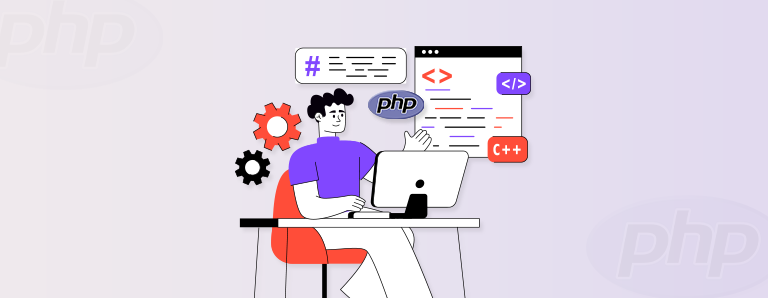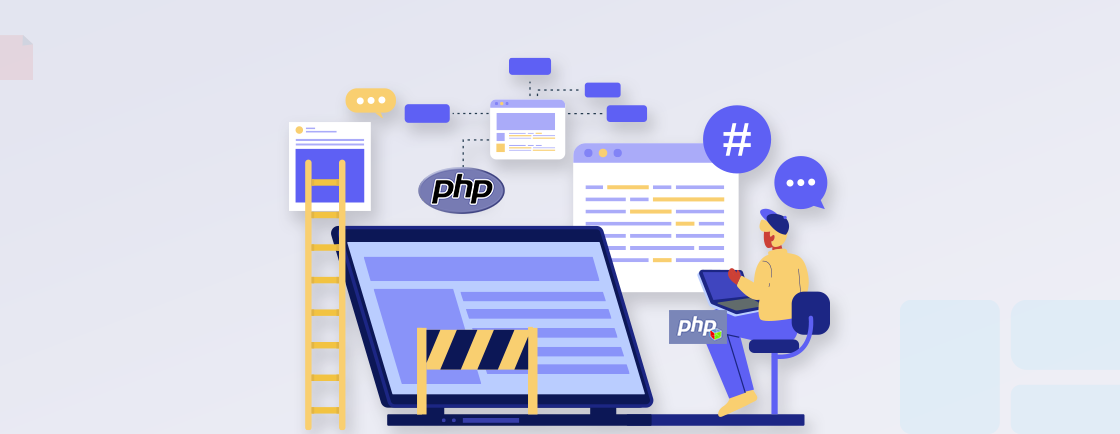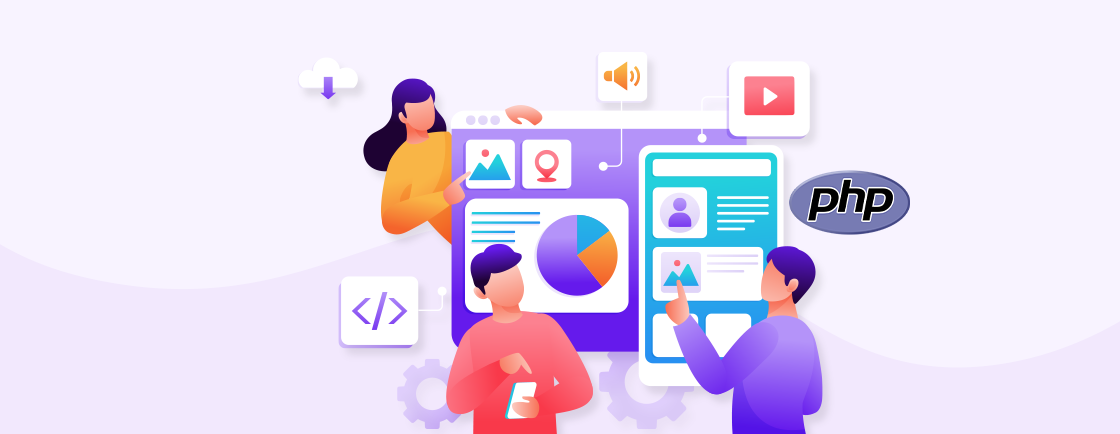Table of Contents
Automotive industry is always in search of cutting-edge technology and sleek designs. We can’t control the latter. But for cutting edge automotive technology, I believe one of the best web development languages is PHP.
With PHP, you can create anything from dealership websites to fleet management platforms for efficiency. Forget navigating endless lists of frameworks and libraries. I’ll tell you how the top experts use this platform for creating the best automotive and car tech. Let’s begin.
Why Use PHP in Automotive Car Technology?
While car designs often become the spotlight in the automotive world, powerful technologies like PHP drive the digital experience. Playing a surprising role, PHP powers diverse web applications that fuel the modern automotive landscape.
- Adaptability: PHP’s scalability and flexibility allow developers to build applications that adapt to growing traffic. That ensures your digital presence stays ahead of the curve.
- Community: PHP boasts a vibrant and active community of developers. It offers a treasure trove of resources, tutorials, and available support.
- Integration: PHP’s integration capabilities allow you to connect your web app to various essential services. This streamlines your operations and creates a smooth user experience.
- Proven Track Record: With over 25 years of powering web applications, PHP has a proven track record of success. Numerous dealerships and service providers rely on its reliability and security.
- Cost-Effective: PHP’s open-source nature makes it a budget friendly choice.
Ready to level up your automotive business with PHP? Let’s explore the top PHP frameworks and libraries used in the industry. After that, we will dive into diverse use cases, and answer your questions about PHP and automotive car technology.
Which are the Best PHP frameworks for Automotive Web Apps
Under the hood of any automotive web app lies a powerful engine – the PHP framework. Choosing the right one is important, as it defines the performance, scalability, and development. Here, we’ve compiled a list of top contenders, each offering unique strengths for your automotive journey:
1. Yii
Think of Yii as the all-rounder. It shines in both performance and versatility. Its component-based architecture allows you to pick and choose the features you need. That makes it ideal for projects of all sizes.
- MVC Architecture: Yii follows the Model-View-Controller architectural pattern, promoting separation of concerns and clean code organization. If your automotive application needs UI, business logic, and data handling clearly defined, Yii’s MVC architecture would be good.
- Security Features: Yii comes with built-in security features such as input validation and output filtering. This framework also offers CSRF prevention, RBAC (Role-Based Access Control), and encryption. So sensitive data like vehicle information and user credentials will be safe.
- Database Access Abstraction: Yii supports various types of databases, including MySQL, PostgreSQL, SQLite, and others. This flexibility allows developers to choose the most suitable database solution for storing automotive-related data. That includes vehicle specifications, maintenance records, or user profiles.
Yii has a rich ecosystem of extensions and plugins contributed by the community. So the PHP developers can extend the framework’s functionality easily.
2. Phalcon
For websites and apps that demand lightning-fast performance, Phalcon is your champion. It is written in C and PHP extensions, delivering exceptional speed and efficiency:
- Unmatched Performance. Phalcon outpaces other frameworks in execution speed. This makes it ideal for automotive applications where real-time data processing or high concurrency is required.
- Modular Development: Phalcon follows the HMVC architectural pattern, which enables modular development and better code organization. So complex automotive applications with multiple modules and subsystems would benefit from it.
- ORM (Object-Relational Mapping): Phalcon provides ORM capabilities, allowing developers to interact with databases using objects instead of raw SQL queries. It simplifies the handling of data-models like vehicle specs, parts inventory, and service records.
While Phalcon’s performance benefits are significant, its C-extension nature may require additional configuration and setup.
3. FuelPHP
FuelPHP prioritizes developer experience with its agile approach and clean syntax. This framework is ideal for rapid prototyping and building flexible applications:
- Flexibility and Modularity: FuelPHP is designed to be flexible and modular. So the developers can customize and extend its functionality according to specific project requirements.
- RESTful Routing: FuelPHP supports RESTful routing. It lets you create RESTful APIs for interacting with automotive-related data or services.
- Active Community. Its supportive community provides resources and assistance when you need them most. So the developers can stay up-to-date with the latest technologies and best practices in the automotive industry.
The “best” framework depends on your specific needs. Consider factors like project complexity and performance requirements. For a tailored solution that takes all your unique requirements, you should hire PHP developers who possess the expertise to match the right framework and tools to your vision.
What are the Use Cases of PHP in Automotive Web Apps
The open road of automotive web development stretches before us, powered by the versatility of PHP. Let’s dive deeper into the destinations where PHP fuels various segments of the industry, showcasing its diverse use cases:
1. Dealership and Manufacturer Websites
- Interactive Car Configurators. Picture customers virtually customizing their dream car, covering everything from paint color to rims. This offers unparalleled engagement and boosts sales.
- Immersive Experiences. 360° tours of car interiors and exteriors, transporting users right into the vehicle.
- Appointment Booking. Schedule test drives, service appointments, and consultations online. This improves convenience and customer satisfaction.
- Lead Capture. Capture leads through forms and chatbots, converting website visitors into customers with targeted communication.
2. Online Parts and Accessories Stores
- E-commerce Platforms. Build online stores for selling car parts and accessories. You can also be equipped with search filters, shopping carts, and secure payment processing.
- Inventory Management. Simplify stock tracking, order fulfillment, and automatic notifications. This benefits in ensuring your online store stays well-equipped.
- Compatibility Tools. Help your customers to find parts compatible with their specific car models. This prevents their guesswork and frustration.
- Community Forums and Reviews. Create engagement and build trust by integrating forums and product review sections.
3. Automotive Service and Repair
- Appointment Scheduling. Enable customers to book appointments online with mechanics or repair shops. Leveraging these functionalities you can improve efficiency and convenience.
- Service Estimation Tools. Offer tools where users input car information and receive estimated costs for specific repairs.
- Online Repair Guides and Resources. Attract and engage customers by providing DIY instructions. You can also benefit them with troubleshooting tips for car maintenance.
- Integrated Parts Ordering. Partner with online parts stores to allow customers to order needed components during their appointment booking.
4. Automotive Aftermarket and Communities
- Discussion Boards. Build online communities where car enthusiasts can discuss specific models. You can also share tips, and connect with others, promoting a passionate community.
- Classifieds and Marketplaces. Create platforms for buying and selling used cars, car parts, or accessories. Consider integrating user accounts, search functionalities, and secure transactions.
- Car Club and Membership Platforms. Develop websites and applications for managing car clubs, event management, and membership subscriptions.
- Social Media Integration. Implement social media sharing buttons and commenting features to encourage community engagement.
5. Connected Car Data
- API Integration. Harness APIs provided by car manufacturers or telematics companies to access data. It could include fuel levels, location information, and diagnostic codes unlocking insights.
- Data-driven Dashboards and Reports. Visualize connected car data in dashboards and reports. This offers insights into driver behavior, fuel efficiency, and maintenance needs.
- Fleet Management Tools. Develop applications for fleet managers to track vehicle locations and optimize routes, leading to operational efficiency.
- Predictive Maintenance. Build systems that analyze car data to predict issues and recommend preventive maintenance.
There are vast possibilities with PHP and automotive car technology, this is just a glimpse. Whether you’re building a dealership website or a connected car platform, PHP offers the flexibility to bring your vision to life. So, explore, experiment, and unlock the potential of this versatile language to fuel your automotive web app journey.
Conclusion
The combination of PHP and automotive car technology predicts a new era of innovation and efficiency in the industry. PHP, with its versatile frameworks and dynamic capabilities, offers a potent solution for developing web applications tailored to the specific needs of the automotive sector.
- PHP offers a set of frameworks such as Yii, Phalcon, and FuelPHP to build dynamic and efficient web app solutions.
- With diverse use cases ranging from dealership websites to connected car data management, PHP enables enhanced user experiences and streamlined operations.
- It holds the potential for future advancements. You can incorporate PHP and AI for future-proof analysis and control systems.
Looking to incorporate PHP and automotive car technology into your web app? Opt for our PHP development services to get the best results.
FAQs About PHP and Automotive Car Technology
How is PHP evolving to meet the demands of future automotive technologies?
The future is bright for PHP in the automotive world. Frameworks like Yii benefit in both security and performance criteria. This allows you to integrate with evolving technologies. Further, Cloud platforms improve scalability, ensuring your web apps can handle increasing demands.
Can I use PHP for developing AI-driven features in automotive software?
Absolutely! Frameworks like Laravel Spark help integration with popular AI libraries. With AI-powered chatbots, you can create analysis tools to extract customer insights. Or image recognition algorithms in repair tools automating fault detection.
How does PHP enable real-time monitoring and control in automotive systems?
While not controlling car systems in a direct manner, PHP excels at building web applications. These applications can offer an interface with real-time data sources. The key lies in PHP’s ability to integrate with APIs and data streams. You can leverage this to build user interfaces that reflect real-time information from car systems.
Master PHP Web Development
Access expert guides and tips to enhance your PHP programming capabilities.





